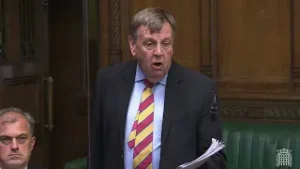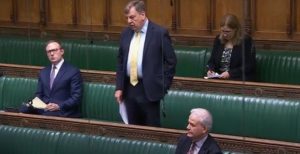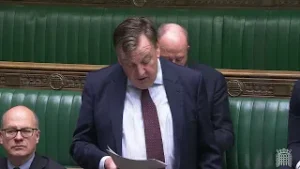Sir John Whittingdale spoke in the debate on the Petition calling for a General Election which took place in Parliament on Monday, 6th January. The petition has achieved over 3 million signatures with the second highest number of signatures coming from the Maldon constituency (now 8,059 – see table below from 2nd January).
In his speech, Sir John recognised that the British constitutional system does not allow an early election unless this is triggered by a request from the Prime Minister or a vote in Parliament. However, he recognises the sense of anger and betrayal felt by many that the Labour Government has already broken so many of the promises made during the election campaign. Sir John’s speech is below:
To watch the debate in full follow this link: LIVE: Parliament debates petition for UK general election (1: 11: 00)
For a full clip of Sir John’s speech see below:
For the transcript of Sir John’s speech see below:
It is a pleasure to serve under your chairmanship, Mrs Harris. I, too, thank the Chair of the Petitions Committee, the hon. Member for Caithness, Sutherland and Easter Ross (Jamie Stone), for introducing the debate, and, through him, Mr Michael Westwood, who has given us an opportunity to debate these matters.
I am proud to speak on behalf of the constituents of Maldon, 8,057 of whom had signed the petition by the time this debate started—that figure has probably increased even further since. We are the second highest constituency, beaten only by the electors of my hon. Friend the Member for Brentwood and Ongar (Alex Burghart), who I am sure would be here as well were he not serving on the Front Bench.
I share the sentiments behind the petition in full, but, as has already been pointed out, clearly under our system the ability to have another general election does not exist, unless there is a remarkable change in the view of either the Prime Minister or of Parliament. Our system is designed to deliver a “strong and stable” Government, and most of the time it does that. I remain a supporter of the system of government, even though I understand the anger felt by the hon. Member for Clacton (Nigel Farage). It is the case that our system was built essentially for when there were two main parties, with perhaps a third minority. We now have not just a third, but a fourth, and even a fifth minority in some areas. That has produced this extraordinary result, whereby the present Government have a majority of 100 seats in Parliament, having achieved fewer votes than the Labour party achieved under its last leader, the right hon. Member for Islington North (Jeremy Corbyn). But that is the system that we have.
The reason why this petition has attracted such support, and so quickly, is not just that people dislike what this Government are doing, but that they feel, as the petitioner sets out, that it is a direct breach of the promises made to the electorate at the time of the last general election. Even within a few weeks of the election, I was receiving angry emails from pensioners who had been misled. They had listened to claims by Labour spokesmen during the election that if they voted Conservative, a Conservative Government might abolish the winter fuel allowance. The implication of that was that a Labour Government would be safe and would protect the winter fuel allowance. Yet a few weeks later, it was announced that it would go.
That was followed a few weeks later by the farmers. The farmers in my constituency had been to the National Farmers’ Union conference and had listened to the leader of the Labour party tell them, from the platform, that a Labour Government would have no intention of getting rid of agricultural property relief. Yet that was precisely what was announced in the Budget. The consequence is that families who have farmed in my area for generations, going back to their great grandparents, now say that they will have to sell up because they will not be able to afford the inheritance tax bill.
I have also had letters from small businesses that understood that working people would not see a tax rise, but they—the people who employ those working people—now find that their entire profit has been wiped out by the increase in national insurance contributions, with the result that they will now have to either scrap pay rises this year or, in some cases, lay off staff.
In my constituency in Essex—which, as my right hon. Friend the Member for Rayleigh and Wickford (Mr Francois) pointed out, was well represented in the petition—we were already faced with a massive amount of development taking place with no corollary in terms of infrastructure. The new housing targets that have been imposed in Maldon represent an increase of 100% on what was already required, while in Chelmsford they represent an increase of 60%—and yet there is no sign of the infrastructure investment. Those targets are being imposed on our local communities despite the Labour party saying that it would take into account the feelings of local communities. In all these areas, people listened to what they were told in the election and have found that the new Government have done precisely the reverse of what was promised.Column 210WHis located here
I am completely opposed to increasing VAT on school fees, but at least Labour did put that in its manifesto. Have my right hon. Friend’s constituents told him, as mine have told me, that one of the reasons they are so angry about the decision on winter fuel allowance is that it was not in the manifesto, they were not told that was what they were voting for and, therefore, Labour has no mandate for it at all?
I entirely sympathise with my right hon. Friend’s point. The winter fuel decision was a very direct breach of an undertaking given, but even with VAT on schools, which he correctly says was in the Labour party manifesto, it was said that the money it raised—if it does raise any money, which a number of us doubt—would be invested in employing teachers and go to schools. However, in the last few days, we have heard that there is no guarantee of that at all and the money will just go to the Treasury. The assurances given about how this will benefit state pupils have, again, proved worthless.
There will not be an election unless something extraordinary happens; under our system, only the Prime Minister or Parliament can call an election early. I suspect the Father of the House, my right hon. Friend the Member for Gainsborough (Sir Edward Leigh), is the only other person here who can remember when a Labour Government were brought down in a confidence vote in 1979. With a majority of 170, that is unlikely to happen to this Government. Prime Ministers who have called elections earlier than five years have found that it was not always a wise decision—as was certainly the case in 2017 and, arguably, in 2024—so the truth is we are likely to have this Government in power for the next five years, but I believe it is unlikely to be longer.
We will use that time to regain trust. The new leader of the Conservative party is right that we have to work to do. We did not get everything right and, indeed, made some bad mistakes. We need to learn from that, just as the Conservative party did in 1974 and 1997, when we reflected on the reasons why we lost and worked hard to regain trust. However, in the meantime, we also have a job to do over the next five years in holding this Government to account. I echo the remarks of the Father of the House: even if this debate does not bring about a general election, I hope that Labour Members will listen to the voices expressed in terms of the 3 million signatures on the petition.


